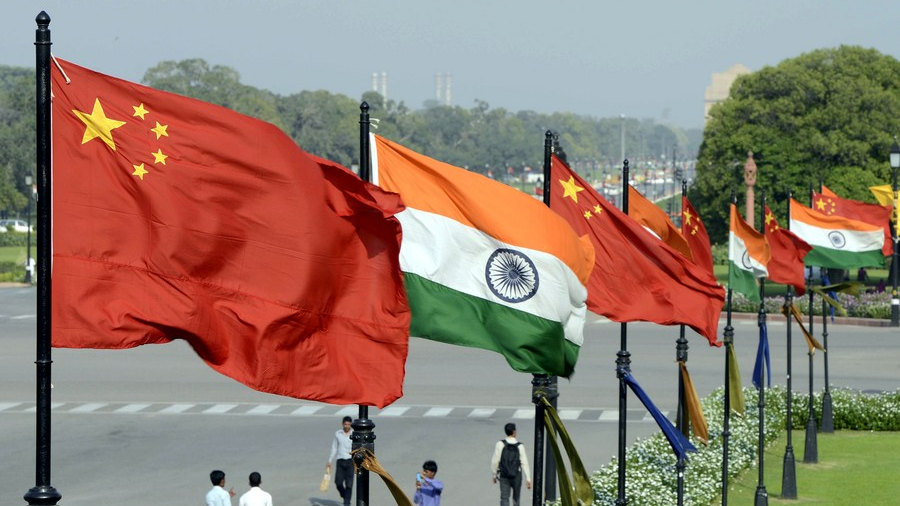
Indian and Chinese national flags flutter side by side on lamp posts at the Raisina Hills in New Delhi, September 16, 2014. [Photo/Xinhua]
By Rabi Sankar Bosu
Since the 13th round of talks between Indian and Chinese military officials on October 10 at the Chinese side of the Moldo-Chushul border meeting point of the Line of Actual Control (LAC) to solve the disengagement issue ended in an impasse, it can be said that the 17-month-long border row is not solved. As such, the stalemate in the Indo-Chinese meeting has reminded the leadership of the two close neighbors about their due responsibility to make more efforts for a peaceful dialogue in order to preserve their friendship, not the opposite way.
More importantly, the meeting clearly sends two clear messages: First, the Sino-Indian relationship should not be spoiled by the border skirmish; and second, to the Indian media on behalf of the Chinese media that they should not make fake news on border disputes to whip up anti-China hysteria in the country.
The LAC along the India-China border has long remained a bone of contention between the two nations.
There is little doubt that the deadliest clash between Indian and Chinese soldiers in the disputed Galwan Valley in the Ladakh region in June of last year, which resulted in 20 deaths on the Indian side and four on the Chinese side since 1975, has deeply hurt the essence of Sino-India relations- "Hindi-Chini-Bhai-Bhai" (India and China are brothers).
It is natural to have disputes and differences between the two big neighboring countries. But keeping these differences for a long time is not in the interest of neither the two countries, not for Asia, even the whole world also.
Right after the Galwan Valley clash, while Chinese media basically reported this news in a balanced way and not made any sensational propaganda, unfortunately, many Indian media outlets made fake news on border disputes which is not good for both sides to seek solutions. In other words, it can be said that India's China policy would not be kidnapped by its nationalistic media reports to reach a consensus with China, albeit Prime Minister Narendra Modi's "Neighborhood First policy" has been antagonizing all of its small and big neighbors.
It's really unfortunate that right after last year's border skirmish, Indian media outlets came up with misleading headlines on the India-China border issues painting China as a villain. The latest example of such type of sensational propaganda was that India media News18 citing Indian army sources, although unidentified, reported that India foiled the Chinese troops' incursion by temporarily detaining a few Chinese soldiers in the Tawang sector in Arunachal Pradesh.
It should be noted here China has long been opposed to New Delhi's consistent stand that Arunachal Pradesh is "an integral and inalienable part of India" rather China claims Arunachal Pradesh as part of southern Xizang (Tibet).
But, on October 8, Chinese Foreign Ministry spokesperson Zhao Lijian said that he wasn't aware of "relevant information" regarding the detention of Chinese soldiers by Indian troops in the Zangnan area of southern Xizang. Surely, such type of misleading news published in the Indian media on the border disputes is not good for the Indian government to reach a consensus with China.
No doubt, Modi's America-facing diplomacy has damaged India's traditional ties with China. Instead of blaming China for the border disputes, it's now necessary for India to make some course corrections in its China policy to have good relations with its second-largest trading partner. India has much more to gain by working with China and not against it.
The Modi- led Indian government seems to have made a mistake on the U.S.-led Quadrilateral Security Dialogue issue. What does India benefit from the QUAD alliance if it moves away from its security issue? It is wishful thinking that the U.S. or other Quad allies will come forward to help India if another Galwan Valley type situation could arise in mountainous areas along the LAC.
There is a fairly popular view that two powers, especially those that are neighbors of each other, will inevitably become strategic competitors, and there will also be conflicts, differences and competition among strategic partners which cannot be avoided. It would be highly desirable and worthwhile that both India and China should forget their enmity and solve the sensitive border and other issues through peaceful dialogue and faithful co-operation by avoiding geopolitical traps in this COVID-configured world in order to render the bond of amity and help to Sino-India ties.
The author is an Indian contributor to Chinese media outlets.

 中文
中文



